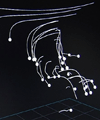Research has all the right moves

(PhysOrg.com) -- A juggler and a conductor were among the artists who helped create a device which can retrieve dozens of different movement sequences in a matter of minutes.
Motion capture tools are used by the performing arts for everything from live productions to creative screen-bound works, choreographic notation and archiving, but it is difficult to identify required sequences for a given project amid the mass of data these tools generate.
Led by principal investigator Dr Sally Jane Norman, Director of Culture Lab, Newcastle University, researchers have come up with a prototype data retrieval tool which makes selecting movement features or sequences much easier: the user 'sketches' the required movement with a mouse or pen and this triggers a search for a similar sequence.
Details of the research are being published online in the Royal Society journal Philosophical Transactions of the Royal Society A today (Monday 1 June 2009).
"Capturing human movement data theoretically interests a variety of people, but its actual usefulness depends on how effectively data retrieval and analysis can be performed," explained Dr Norman. "This development opens up far more cross-sector opportunities, making human motion capture a rich area of interdisciplinary investigation twenty years after the animation industry first teamed up with biomechanics experts."
As performing artists can accurately reproduce complex gestures and adopt novel creative approaches, they are ideal test subjects for developers tracking human movement.
Motion capture works across many disciplines, with artistic performance skills combined with research from sectors such as biomechanics, sensor development and information processing.
In addition to the biomedical sector, where movement is monitored for diagnostic or corrective purposes, motion capture libraries are increasingly being used by the cinematographic and games industries, and in education, advertising, training manuals and simulators.
More information: Royal Society journal Philosophical Transactions of the Royal Society A: Issue No. 1898 Vol 367.
Provided by Newcastle University

















